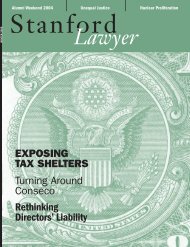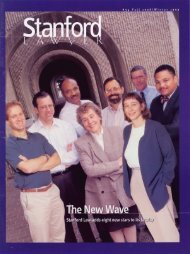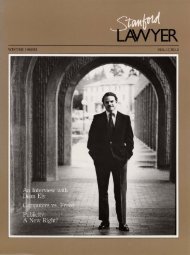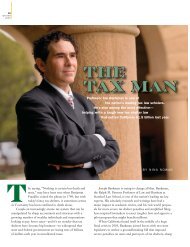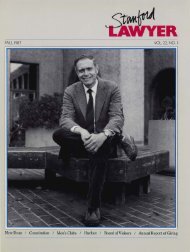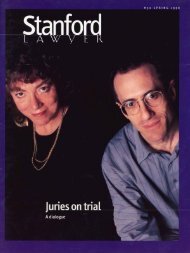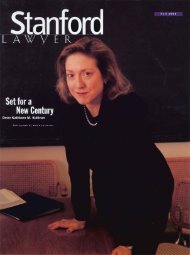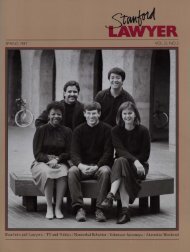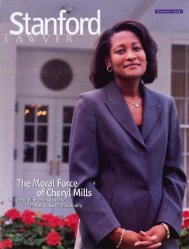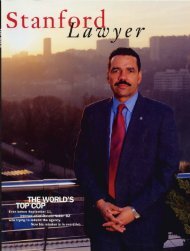Issue 73 - Stanford Lawyer - Stanford University
Issue 73 - Stanford Lawyer - Stanford University
Issue 73 - Stanford Lawyer - Stanford University
Create successful ePaper yourself
Turn your PDF publications into a flip-book with our unique Google optimized e-Paper software.
NEW FACULTY<br />
31<br />
STANFORD<br />
LAWYER<br />
As director of the clinic, Koski teaches a class on law and education policy, supervises students<br />
representing clinic clients, and oversees complex school reform litigation. In addition, he and the students<br />
influence education policy at the state and local level through research and advocacy: some of<br />
the recommendations made by his clinic were incorporated into California’s Senate Bill 1895, which<br />
provided for mental health services for disabled kids. It was passed in 2004.<br />
“Schooling has such a deep and lasting impact on people,” Koski said. “Everyone deserves a firstrate<br />
education.”—Mandy Erickson<br />
Environmental Expert Margaret Caldwell ’85<br />
Promoted to Senior Lecturer<br />
Margaret “Meg” Caldwell ’85, who came of age with the ecology movement, was<br />
forever imprinted with a lasting desire to fight for the environment. “I grew up in<br />
the ’60s,” explained Caldwell, the director of the Environmental and Natural<br />
Resources Law & Policy Program at <strong>Stanford</strong> Law School. “That was the awakening<br />
of environmentalism. I decided in the sixth grade that I wanted to be an<br />
environmental lawyer, and I never wavered in my goal.”<br />
Not only did Caldwell become an environmental lawyer, but she now chairs one of the most powerful<br />
land use agencies in the nation, the California Coastal Commission, which has broad powers to<br />
regulate California’s coastline. This fall Caldwell was promoted to the position of senior lecturer at<br />
<strong>Stanford</strong> Law School. Caldwell started her career with Bingham McCutchen LLP in San Francisco,<br />
where she represented land owners in cleaning up superfund sites. She later joined the City of<br />
Saratoga (California) Planning Commission. “That’s where I cut my teeth on land use issues,” she said.<br />
Since joining the law school in 1994, Caldwell has spent much of her time compiling a collection<br />
of business-school-style case studies of environmental and natural resources law. Teaching with case<br />
studies, Caldwell said, is a more effective teaching tool: “It allows students to discover the law for<br />
themselves and learn how to become problem solvers.”—Mandy Erickson<br />
International Law Scholar Helen Stacy Promoted<br />
To Senior Lecturer<br />
In the late 1980s, Helen Stacy was a barrister in London, struggling to prosecute<br />
defendants being carted from jail to jail. Initially sent from her native Australia to<br />
extradite an alleged drug trafficker for trial, Stacy noted the differences between<br />
standards in the Australian, British, and European legal systems.<br />
Later, as a professor in the Faculty of Law at Queensland <strong>University</strong> of Technology<br />
in Brisbane, she researched the differences between legal systems, receiving a scholarship to<br />
study in Germany and teaching in Indonesia and South Africa. “It’s fascinating to watch the centripetal<br />
pull on one country’s legal performance because of standards in neighboring countries,” she said.<br />
Stacy has brought this fascination to <strong>Stanford</strong>, where she has taught international human rights<br />
and international jurisprudence at the law school. Her promotion this year to senior lecturer at the<br />
law school gives her a stronger platform from which to teach. Part of Stacy’s work is comparing the<br />
efforts of Romania, Mexico, and Thailand in improving their court systems and their policing.<br />
Stacy is also studying the problem of applying international standards to different cultures in a book<br />
she is writing, Human Rights and Globalization (<strong>Stanford</strong> <strong>University</strong> Press, 2006). “I am making the<br />
argument that regional courts like the European, Inter-American, and African systems, and hopefully<br />
one day also, an Asian system are a linchpin to better human rights,” Stacy said.—Mandy Erickson





